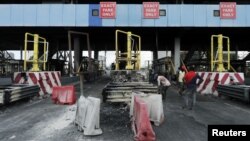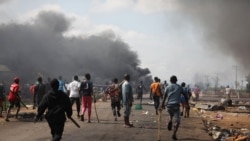Nigerian rights activists are praising a Lagos state report into protests last year against a controversial special police unit. Days of protests against the Special Anti-Robbery Squad (SARS) in October 2020 came to a halt when security forces fired on the demonstrators at a toll gate, leaving at least 11 people dead. The report, leaked Monday, blamed Nigerian security for the deaths.
The report described the events of October 20 of last year as a “massacre,” stating that agents of the army and police shot at peaceful protesters as they sang the national anthem and waved the Nigerian flag during the evening rally.
The report said there were 48 casualties, including 11 people killed, four people missing and presumed dead, and many others injured with gunshot wounds.
The military, along with police authorities and the national government, have yet to comment on the report, but its findings contradict the early official position on the incident, and corroborate accounts told by many protesters.
“End SARS” activists have praised the report, including Obianuju Iloanya, one of the Abuja protest leaders whose brother was killed by the SARS police unit in 2012.
"When I saw it [the report] yesterday, the first feeling I had was relief because I never expected them to be so transparent or be able to say the truth. I thought that they'll run away from the truth because it's a panel that was set up by government,” Iloanya said.
In October of last year, Nigerian authorities established investigative panels across 29 out of 36 states in the wake of mass protests against police brutality. They were looking into claims, many made by younger citizens, of abuse.
The Lagos state panel received 255 petitions against the police. The panel's findings also showed that the military prevented medical aid from getting to the injured protesters after the shooting, further exacerbating the impact.
In its submission to the Lagos state authorities on Monday, the panel recommended police reforms and sanctions for security agents who took part in the shooting.
The panel also said compensation should be paid to victims and that the government must improve its engagement with the youth and publicly apologize to protesters.
Last year, Amnesty International said at least 12 protesters were killed at the toll gate and made recommendations similar to those of the panel. Speaking before the report was leaked, Amnesty's spokesperson, Seun Bakare, said government usually trivializes these issues.
"The government has consistently refused to take recommendations seriously. Many times they even claim that all that we're saying is absolute lies,” Bakare said.
Iloanya said the leaked report triggered sad memories.
"I felt anger and I felt pain and frustration because these were young people that were out on the streets, and demanding for better and they were killed for that; it's painful thinking about it," he said.
But End SARS activists like Iloanya say the Lagos panel's findings and honesty inspire confidence and hope that it prompts other investigative panels to do the same. In the wake of last year’s deadly protests, the government disbanded the SARS unit. Rights groups have said the unit was a symbol of excessive force.





